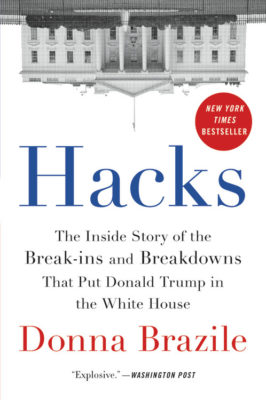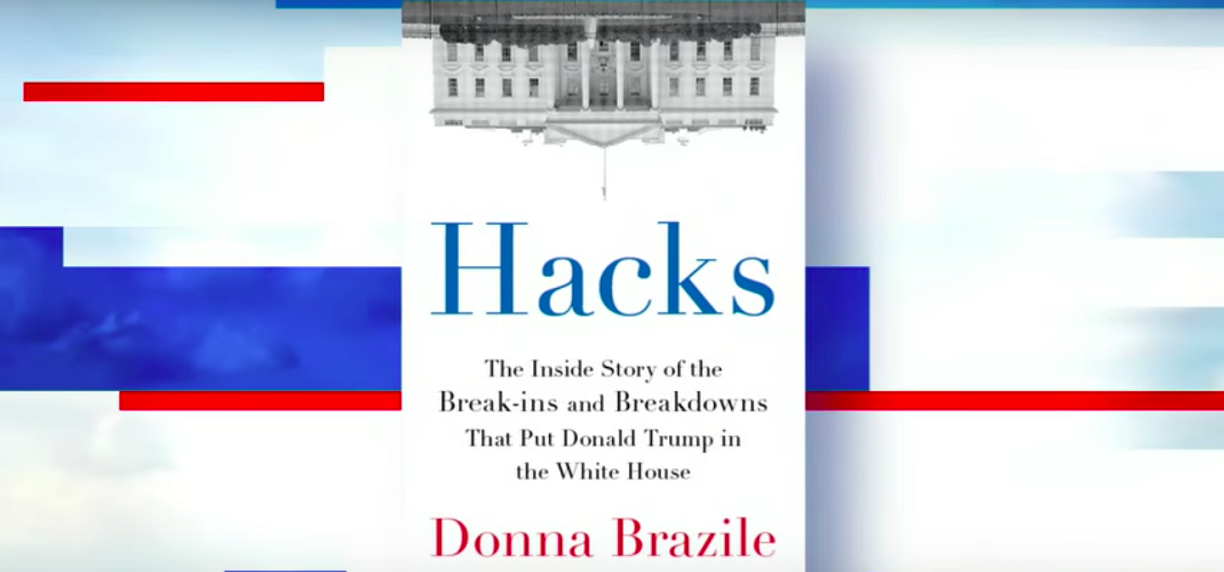
Given the media blitz leading up to the release of her 2016 campaign memoir Hacks, Donna Brazile’s recollection of what it was like to be on the receiving end of the Russian cyberattacks against the Democratic National Committee was far more enlightening than I had expected.
That’s because, ahead of the Virginia state elections in November 2017, Brazile’s press interviews and excerpts tended to be internecine and conspiratorial, focusing on how the Hillary Clinton campaign had unethically took over the DNC at Bernie’s expense, or how Hillary didn’t call Brazile for a while after she lost the Electoral College, or how staffer Seth Rich’s murderer still needed to be found.
Now, this is not what most of the book, subtitled The Inside Story of the Break-ins and Breakdowns That Put Donald Trump in the White House, turns out to be about, but the strategy was successful. The book reached No. 5 on the New York Times bestseller list, sold out on Amazon, then faded from public consciousness.
That’s a shame, because the best part of Brazile’s memoir ought to be exciting enough to have lasting appeal. As the Mueller investigation into the Trump campaign and its Russian ties continues, it’s certainly the most consequential.
The former DNC Chair goes into what it was like at the national committee that summer and fall, knowing two competing Russian intelligence agencies had broken into their systems and gained access to months’ worth of private data with the intention of hurting the Democratic nominee in every way possible.
The countermeasures that volunteer, White Hat hackers had to make; the dilemma of whether to take down compromised systems but potentially ruin Get Out The Vote efforts; and the cooperation they had with the Federal Bureau of Investigation, even as Donald Trump continued to publicly ask for more Russian hacking and Wikileaks dissemination — it’s all deeply engrossing material.
For that subject, at least, Brazile seems to have no vested interest in doing anything more than relating information to the reader, sharing the mostly untold story of what it is to be the victim of a break-in when all anyone wants to talk about is the most embarrassing items your burglars stole.
Unfortunately, with everything else she recounts, Brazile is concerned more with CYA work than writing anything trustworthy or insightful.
Brazile was memorably in the limelight prior to the convention after it was reported that she sent a minor question to the Clinton campaign in advance of a Democratic primary debate. She lost her job at CNN over it; it had to be addressed. That’s the inherent unfairness with this burgled communication.
Yet, after admitting in a Time magazine editorial that sending those emails “was a mistake [she] will forever regret”, she claims in this book that her earlier apology was insincere because she couldn’t remember or find where she’d sent the message in her own records and it must have been a work of Russian sabotage.
Like a Schrodinger’s thought-experiment version of a campaign memoir, in Brazile’s telling, the Democratic primary was both one-sided and fair; Seth Rich’s death was both a nefarious conspiracy that made Brazile fear for her life walking around D.C. and a cynical ploy of Julian Assange and right-wing media at the expense of Rich’s parents; Hillary Clinton’s bout with pneumonia was a serious issue of a candidate’s health to the point her campaign’s deceit compelled Brazile to contemplate replacing her on the ticket as well as a complete overreaction by the mass media, another example of society’s pervasive misogyny.
Most fundamentally, Brazile is the overstretched figurehead of a hapless DNC that was deeply in debt, subordinate to the Clinton campaign, and hobbled by cyberattacks while also a central player in the drama, the powerful leader of the estimable national party whose strategic plans were often thwarted by the Clinton campaign based in Brooklyn that wouldn’t listen.
Brazile is a lifelong Democrat and experienced political operative. She surely had valuable insights to give, whether in a campaign or in a memoir. But in 2000, as Al Gore’s campaign manager, she also lost a presidential election by a razor-thin margin, despite winning the popular vote, and her decisions afterward were easy to mock and second-guess by those who didn’t have decisions to make.
Incredibly, Brazile actually had experience with what a campaign can do if it receives unethical help against its opponent, as Gore’s did when it received material from George W. Bush’s preparation prior to their first debate.
She was someone actively involved in both 2000 and 2016 from different positions, and she ought to have a unique perspective into what it’s like to lose an election under circumstances considerably short of strictly fair. There are few people I can think of who could have written a better memoir than her.
Instead, Brazile and her publisher decided to release something that was timed and marketed for Festivus, but not intended to last beyond it.

